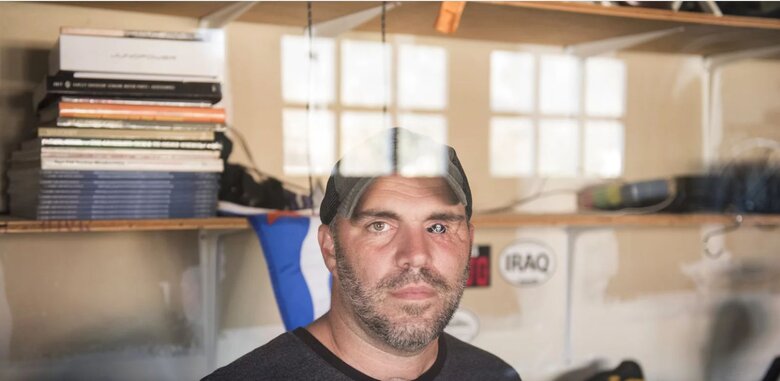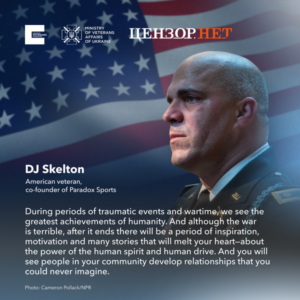Talking to US Army Major DJ Skelton, you feel the calm strength of a person who has gone through a lot of difficult situations in his life, but overcame them and learned to live in new life circumstances.
Such people have a special communication style and outlook. They will not promise anything extra – but what they promised, they will definitely fulfill their promise. And they also know how to help wounded veterans: Skelton is one of the co-founders of Paradox Sports, an organization that helps veterans adapt to a peaceful life through active, sometimes extreme sports.
DJ is a multi-faceted man: fluent in Chinese, well-read, and the bookshelves in his home in Monterey, California, would be the envy of many book lovers. And instead of Skelton’s lost eye, there is an image of the pirate Jolly Roger, a vivid testimony of his reluctance to give up and an irresistible sense of humor.
-DJ, after you and your company were attacked by Iraqi insurgents during the Second Battle of Fallujah in November 2004, two grandes hit the concrete next to you, one of them exploded, and the bullets hit his left arm, right leg and breast. To make matters worse, the fragment that entered your right cheek damaged the upper part of your mouth and exited the left side. You were evacuated by your fellow soldiers and then you passed out at Walter Reed National Military Medical Center, where doctors told you that you would never be able to climb mountains, never be able to run. DJ, did I quote an exact quote from one of the posts
about you?
Yes, it is quite accurate.
Tell me, and in the following weeks – were your thoughts more focused on your comrades-in-arms and your inability to be with them now? Was it thinking about what you would do now with one working eye and multiple injuries?
This is a great question. You know, my injuries were quite serious. So when I got out of the hospital – and I spent a lot of months there at Walter Reed and I really didn’t want to be there – my first emotions were like this: I wanted to go back to my unit and continue to serve. So part of me as a young army officer in the infantry felt like I had abandoned my brothers on the battlefield.
I am sure that doctors and psychologists have a special term for this.
– I’m sure there is, too, but I didn’t stay there long enough to talk to them. So, I tried to get out of there as quickly as possible. But, you know, I didn’t want to believe how seriously I was injured. And I didn’t want to believe and accept this reality that I would have obstacles like brain injury and post-traumatic stress disorder. And more practical consequences. I have physical limitations. I have no left eye. I still don’t have full use of my left hand. So, you know, we have to go through this process to figure out how to do what we love to do in life. Within this new state with these new restrictions. I haven’t even started this journey yet. Therefore, it was simply important for me to return to the army, to my unit and continue my life as if nothing had happened, as if I had not been wounded. Like, just take me for an adaptation and I’ll be back! But it did not happen that our armies are very large organizations. They have a lot of bureaucracy and make a lot of decisions.

– As, unfortunately, in all armies.
– Yes, and in each country, the army has a procedure that wounded soldiers go through to determine whether they are able to continue serving. So I went through a process called a medical board and the Army declared me unfit for duty. At that time, I had no opportunity to return to the battlefield and join my soldiers. But they found places in the army where I could work and contribute.
– Are you talking about your further experience in Afghanistan?
– Not at all. Yes, after being discharged from the hospital in 2005 and until 2010, the army assigned me to non-military positions. I was stationed in Alaska where I worked in the operations division. I also worked at the Pentagon, was involved in politics, worked on documents that contribute to improving the care of wounded soldiers that the Pentagon provides. I have had the opportunity to work in various organizations and centers helping to influence legislators and help them better understand the wounded servimen experience and the needs that should have been met, but for whatever reason, that wasn’t happening.
– In the hospital and the first year outside of it – who supported you?
– I had my family, who were the first to come to the hospital and helped me in the initial stages of recovery. My mom, my dad, my sister, and my cousins, aunts, and uncles who really helped. I have also had members of the military community from my previous life come to see me; they also helped in different ways. This is very important, this is the brotherhood and sisterhood that we have in the army. I served for several years and the leaders I served with came to the hospital and helped me transition to a new life. I was very fortunate to have the opportunity to study at the United States Military Academy at West Point, and even the instructors from the Academy would come, call or write letters and help.
Also, I grew up in nature, in a climbing community. Many people from this community came and supported in any way possible. So I was very fortunate to have these communities that I belonged to. And people, some of whom had no connection with the armed forces, but nevertheless came with their support.
– They say that in the USA, church communities quite often help people, but this, of course, depends on whether a person is religious or not.
– Churches are a great resource here in the United States. There are many veterans’ organizations and non-profit organizations in the US that provide assistance. People from our society, from local communities, they help even those whom they have never met. But if you know, trust, and love someone, you will do everything you can to help that person. A lot of these relationships mostly happen in universities when you’re studying. Or in schools, as well as at work and in other areas of life. So I was very fortunate to have these relationships that were already established when I was injured and people could come and help. Churches are certainly a big part of this process.

One of the Ukrainian veterans I interviewed was (and still is) a basketball fan; he himself played and watched tournaments on TV. And then he was injured, his left arm was amputated, and he was depressed. But here’s what his wife told him: Yes, you may not be able to play basketball with your friends anymore – but that right arm will stay and hug our three-year-old daughter and me and be able to do anything else. And it was this phrase of his wife that brought him out of depression. And what comforting words affected you? – Regarding your story, I can tell this Ukrainian soldier, now a veteran, that this does not mean that he will never be able to play basketball again. It’s just that now he will play a little differently. He will have a slightly different look, but there will always be a way if he wants to play.
– By the way, I do not rule out that he is already trying to play basketball. It was just that there was a situation when he was desperate.
– I like to say that life should be lived according to one’s own rules, without living the life of other people. One thing that I have struggled with for years and it took me a long time to understand is that I will not be the person I was before the injury and I will not be able to act and function the same way if I were on 100% healthy mind and body. Therefore, you need to find a way to accept it for yourself, to build your dignity and life on the basis of a new norm, a new state. It requires painstaking work, and the sooner we can rebuild this foundation for a new chapter in our lives, in which we will have to revise some old principles that no longer exist, the stronger we can build it, surrounded by people we trust and who help us in this. This is what has allowed me to move forward in life, to get the medical care I need to enable me to work in positions that make me happy and feel like I’m contributing and a valued member of a team, and it is not a charity. To be able to return to the community and participate in activities that make me happy. I like rock climbing, I like to go to the sea, I like to go hiking. And I won’t be able to do it at the speed, pace, or ability of people of normal physical health in society. But that’s normal. So you’re finding your new boundaries and figuring out how to implement that in this new space. And when you look at it that way, it’s not, “I’ll never do that again,” but “Okay, I still want to do what makes me happy. How can I do it now within these new constraints?” – this is a new attitude to life. And to be honest, if people have a problem with that, that’s their problem, because in society there can be conflict with any type of people.
– Another key moment from that stage of your life: when you were psychologically very bad, your rock climbing friends “kidnapped” you into nature, into the sphere of their occupation. And this, as I understand it, turned out to be a real therapy session. Am I understanding correctly?
– Yes, there were people in my life who saw potential in me and did not pay attention to my appearance or physical limitations. It was important to them to just spend time with me, do interesting things and maintain communication and community. At that period of my life, when I looked at myself in the mirror, I did not see high self-esteem and self-worth in myself. In my eyes, there were a thousand reasons why I would never be able to have a quality life. But at the time, I didn’t fully realize how important it was. It will forever remain in my memory as the moment I realized how many veterans return from war without such support and community. When we are too weak and worried, trying to understand the new life, there are people around us who inspire and motivate us, remind us that there is an amazing life full of possibilities out there. It made a huge difference in my recovery, was a luxury, an important milestone.
And it was very important to me that this support did not come from the military, but from the local community, who did everything possible to make me feel part of the group again. This has always been a foundation for me, regardless of whether I worked in public organizations or in the army. I don’t care what the federal government does. I don’t plan to spend the rest of my life in a government environment. I want to live in a small town or a big city, interact with people and have a happy life. I’m glad that there were opportunities and that they felt comfortable talking and working with me.
Read the rest of the interview at this link (https://censor.net/ua/resonance/3423504/amerykanskyyi_veteran_di_djeyi_skelton_pislya_viyiny_v_ukrayini_ya_bachu_veteraniv_yak_nevidyemnu_chastynu).


